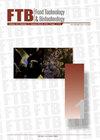营养对咽喉反流患者发病、病程及生活质量的影响
IF 2.5
4区 农林科学
Q3 BIOTECHNOLOGY & APPLIED MICROBIOLOGY
引用次数: 0
摘要
研究背景。饮食习惯在喉咽反流病(LPR)患者中的作用尚未得到充分探讨。该研究的目的是检查LPR患者的饮食习惯、发病和病程以及生活质量。实验方法。将改良食物频率问卷(FFQ-m)和咽喉反流健康相关生活质量问卷(LPR- hrql)的结果在有和没有LPR的受试者之间进行比较。LPR组共100例,对照组65例。LPR组进一步随机分为2个亚组;第一组患者接受埃索美拉唑治疗,每日两次剂量20mg,并结合饮食和一般生活方式改变指导;另一组患者接受泮托拉唑治疗,每日两次剂量20mg,并结合饮食和一般生活方式改变指导。参与者被要求在初次检查后立即填写FFQ-m和LPR-HRQL问卷,然后在初次检查后30天和60天的对照检查后填写。结果和结论。与对照组相比,LPR患者消耗更多具有高反流潜力的食物,饮用更多碳酸饮料和果汁,生活质量更差(p<0.001)。质子泵抑制剂每日服用两次,剂量为20毫克,同时改变饮食习惯,如避免食用酸性、辛辣、发酵、甜味和油炸食品以及其他具有高反流潜力的食物,以及碳酸饮料和果汁,同时引入具有低反流潜力的食物和水,可显著减轻LPR的症状并提高生活质量(p<0.001)。创新和科学贡献。这是第一个显示LPR患者饮食习惯和生活质量之间联系的研究。本研究的贡献是对LPR患者随访的客观回顾,可用于其定期评估。本文章由计算机程序翻译,如有差异,请以英文原文为准。
The Impact of Nutrition on the Onset, Course of the Disease and Quality of Life of Patients with Laryngopharyngeal Reflux
Research background. The role of dietary habits in patients with laryngopharyngeal reflux disease (LPR) is comparatively underexplored. The aim of the study is to examine dietary habits, onset and course of the disease as well as the quality of life of patients with LPR. Experimental approach. The results of the modified food frequency questionnaire (FFQ-m) and Laryngopharyngeal Reflux Health-Related Quality of Life (LPR-HRQL) questionnaires were compared between subjects with and without LPR. There were a total of 100 subjects with LPR and 65 subjects in the control group. The group of subjects with LPR was further randomly divided into two subgroups; the first subgroup was treated with esomeprazole in a twice daily dose of 20 mg combined with dietary and general lifestyle changes instructions, and the other with pantoprazole in a twice-daily dose of 20 mg combined with dietary and general lifestyle changes instructions. Participants were instructed to fill out FFQ-m and LPR-HRQL questionnaires immediately after the initial examination and then after control examinations that were 30 and 60 days after the initial examination. Results and conclusions. Patients with LPR consume more food with high reflux potential, drink more carbonated drinks and juices, and have a worse quality of life compared to the control group (p<0.001). Proton pump inhibitors in a twice-daily dose of 20 mg with a change in dietary habits, such as avoiding acidic, spicy, fermented, sweet, and fried foods same as other foods with a high reflux potential as well as carbonated drinks and juices with the introduction of foods with a low reflux potential and water significantly reduces symptoms of LPR and increases the quality of life (p<0.001). Novelty and scientific contribution. This is the first study showing the connection between dietary habits and quality of life in patients with LPR. The contribution of this research is an objective review of the follow-up of patients with LPR that could be used in their regular assessment.
求助全文
通过发布文献求助,成功后即可免费获取论文全文。
去求助
来源期刊

Food Technology and Biotechnology
工程技术-生物工程与应用微生物
CiteScore
3.70
自引率
0.00%
发文量
33
审稿时长
12 months
期刊介绍:
Food Technology and Biotechnology (FTB) is a diamond open access, peer-reviewed international quarterly scientific journal that publishes papers covering a wide range of topics, including molecular biology, genetic engineering, biochemistry, microbiology, biochemical engineering and biotechnological processing, food science, analysis of food ingredients and final products, food processing and technology, oenology and waste treatment.
The Journal is published by the University of Zagreb, Faculty of Food Technology and Biotechnology, Croatia. It is an official journal of Croatian Society of Biotechnology and Slovenian Microbiological Society, financed by the Croatian Ministry of Science and Education, and supported by the Croatian Academy of Sciences and Arts.
 求助内容:
求助内容: 应助结果提醒方式:
应助结果提醒方式:


